CAMERAS LINED THE player’s entrance to Paycom Arena, bursting with flashes as Indiana’s star guard made his anticipated arrival to Game 1 of the NBA Finals.
Tyrese Haliburton wore an off-white Carhartt button-down jacket, white pants, black shoes and sunglasses. Haliburton’s accessory of choice for the biggest game of his life? His debut signature sneakers, the Puma Hali 1, designed by Salehe Bembury in a hibiscus colorway.
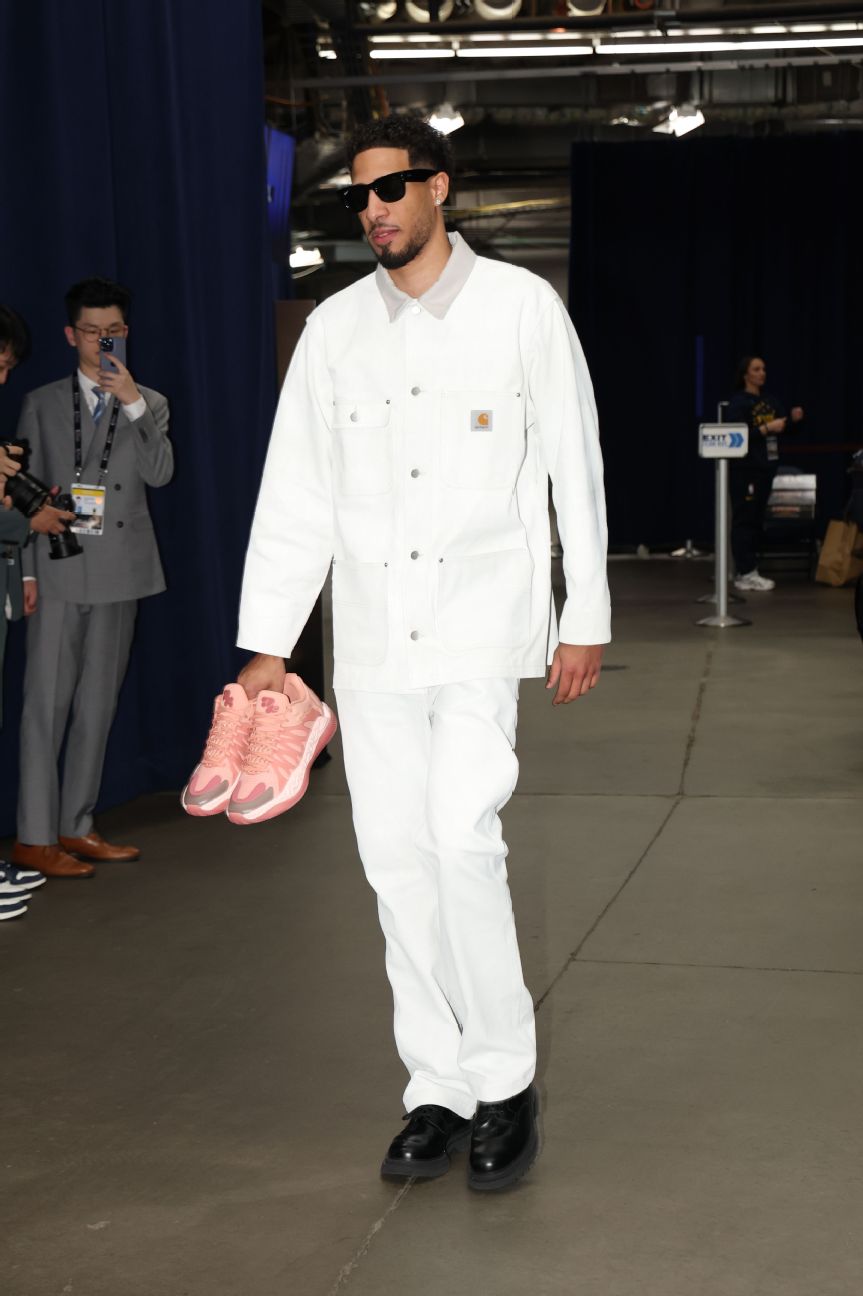
Nearly an hour later, the hallway lit up again as the league MVP made his minute-long stride to the locker room. Oklahoma City Thunder superstar Shai Gilgeous-Alexander walked in with light blue-tinted sunglasses, wearing a comfortable gray shirt jacket and his “Masi Blue” SHAI 001 Converses in honor of his younger brother, Thomasi.
The MVP’s statement piece? A Chanel cross-body bag, enhanced by a pearl-detailed strap and complemented by another, smaller cross-body mini bag.
“Shai’s been doing it since he came to the league,” Haliburton told ESPN about his Thunder counterpart. “He is kind of like the undisputed king of [NBA fashion].”
Gilgeous-Alexander and Haliburton aren’t just two star point guards who have driven the Thunder and Pacers to a 2-2 tie in the NBA Finals, they are also two of the league’s most fashionable players, known for their unique styles and designer outfits that are just as versatile as their games.
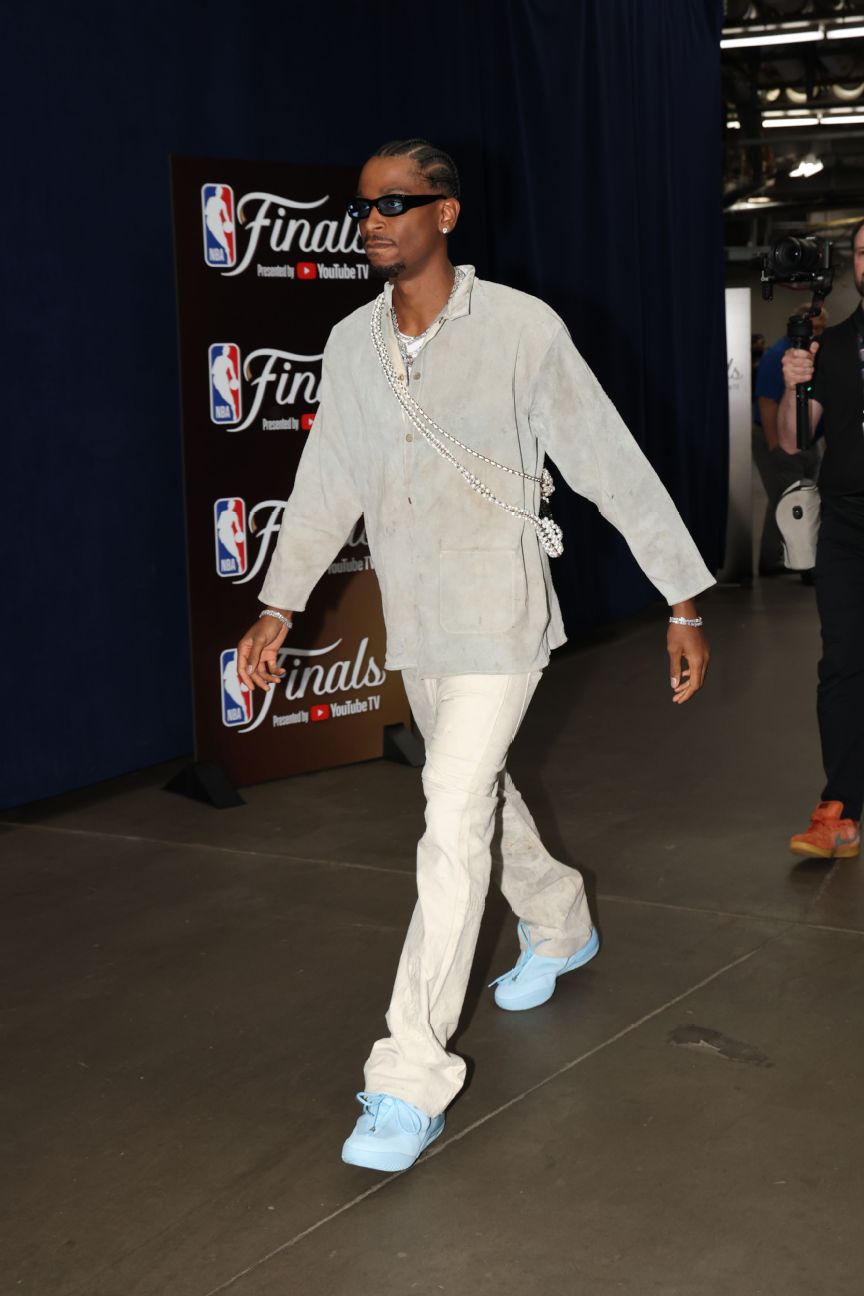
While both point guards are laser-focused on winning their first championship, for themselves and their teams, Gilgeous-Alexander and Haliburton are among the players who have brought a haute couture feel to this small-market NBA Finals showdown.
In the city where Russell Westbrook, James Harden and Serge Ibaka used to strut their finest fits, Gilgeous-Alexander — along with teammates such as Jalen Williams and Chet Holmgren — has Oklahoma City back as the NBA’s fashion capital. And for Haliburton, acutely aware of this moment, he is using this Finals to prove doubters wrong and turn heads with his clutch game and his fashion style.
“OKC is a legendary tunnel with Russ and what Shai’s doing,” Haliburton told ESPN last week on the eve of Game 1.
“OKC is definitely one of everybody’s favorite tunnels.”
WESTBROOK USED TO roam this same tunnel wearing anything and everything from a COOGI crewneck to Saint Laurent boots.
It seemed as though he would go to any length for fashion — even if it meant ripping holes into jeans and sewing pieces, often purchased off the rack.
“My mom used to sew, so I used to watch,” Westbrook told ESPN during the 2023-24 season. “So if I rip something, if I cut it like I cut my jeans, I cut it up myself in the room.
“I can sew it by hand [with a needle]. I ain’t done it in a while, but I can also [sew] it by machine as well, too.”
Gilgeous-Alexander — the first Thunder point guard to lead Oklahoma City to the Finals since Westbrook’s 2012 team — carries the current NBA’s unofficial fashion crown.
“Shai is acknowledged pretty widely as the reigning king of NBA style,” said Wall Street Journal reporter Sam Schube, formerly GQ’s sports director. “He’s the guy who’s really picked up the mantle from LeBron [James], Allen Iverson, Dwyane Wade and Russ. He’s the next dude. … Shai’s sort of his own world. It doesn’t really feel like he’s playing the same game as everybody else.
“I don’t know how much Chanel you’re seeing in the NBA tunnel. That just tells you that that guy knows exactly what he wants to wear and feels great about doing it … to take a really classic fancy French lady women’s wear brand and twist it as an NBA player is like, ‘Ooh yeah.’ You’re feeling good about yourself.”
Gilgeous-Alexander is in the midst of a legendary season. He’s won the regular-season scoring title, MVP, the Western Conference Finals MVP and is working toward a possible Finals MVP.
Westbrook, who won league MVP with the Thunder in the 2016-2017 season, is known to help outfit his teammates by taking them shopping, buying suits or clothes for them and passing on style tips. Now with the Denver Nuggets, Westbrook has kept some of his more memorable outfits, from past Met Galas to his wedding and draft night suits.
These days, he wears mostly his own fashion brand, Honor The Gift. The 17-year veteran dons a different outfit to every game and then gives his clothes to either friends, students at his Westbrook Academy or charity.
“I teach them fashion, but being affordable,” Westbrook said of his shopping excursions with teammates. “I’m not big on having young guys go to [Louis] Vuitton and [Christian] Dior and spending $2,000 on stuff. I’m big on thrift shopping. That’s how I was brought up. My mom was the one that taught and helped me understand about being able to have what you have but also looking good with what you have. And that’s why I was able to create my own brand.”
Now, OKC has another MVP making waves in the fashion world. At 26, Gilgeous-Alexander walked the runway in Thom Browne’s show at Paris Men’s Fashion Week in 2022. He is a former GQ Most Stylish Man of the Year and is Converse Basketball’s creative director.
“The European Fashion Week trip has become kind of a box to check if you’re a pro athlete,” Schube said. “But it’s hard to remember guys walking in a Thom Browne show outside of Shai. He appears to have real relationships with some of these designers and sort of studies the craft as it were in a way that some of his peers don’t.”
It’s no wonder it took him about 40 minutes to assemble “eight to nine outfits” before the Finals in case the championship series goes the distance with alternative options.
“Before every series, I plan out my outfits for sure,” Gilgeous-Alexander told ESPN. “I don’t know if you’ve noticed, but every round I’ve debuted a new colorway of my [Converse] shoe. Round 1, all the outfits were centered around the gray shoes. And then Round 2, they were centered around the black shoes. Round 3, the clay shoes. And this round would be the blue shoes.”
LIKE WHEN WESTBROOK, Harden and Ibaka turned Oklahoma City’s pregames into a modeling runway, Gilgeous-Alexander isn’t the only fashion-conscious Thunder player. Williams, Holmgren and Lu Dort, all key performers on the second-youngest team to reach the NBA Finals, have also expressed themselves through their pregame fashion.
Williams is especially not shy to cause a commotion, once wearing an all-black headpiece that covered his entire head with three cushioned rows across his face.
He was fined $25,000 by the NBA for wearing clothing with profane language on it in his second-round Game 7 postgame media session.
“I say my style right now, it’s baggy,” Williams told ESPN. “But it’s also just me, whatever I’m feeling. So if I’m feeling lazy, I’m not afraid to wear pajamas. I’m not afraid to be comfortable.”
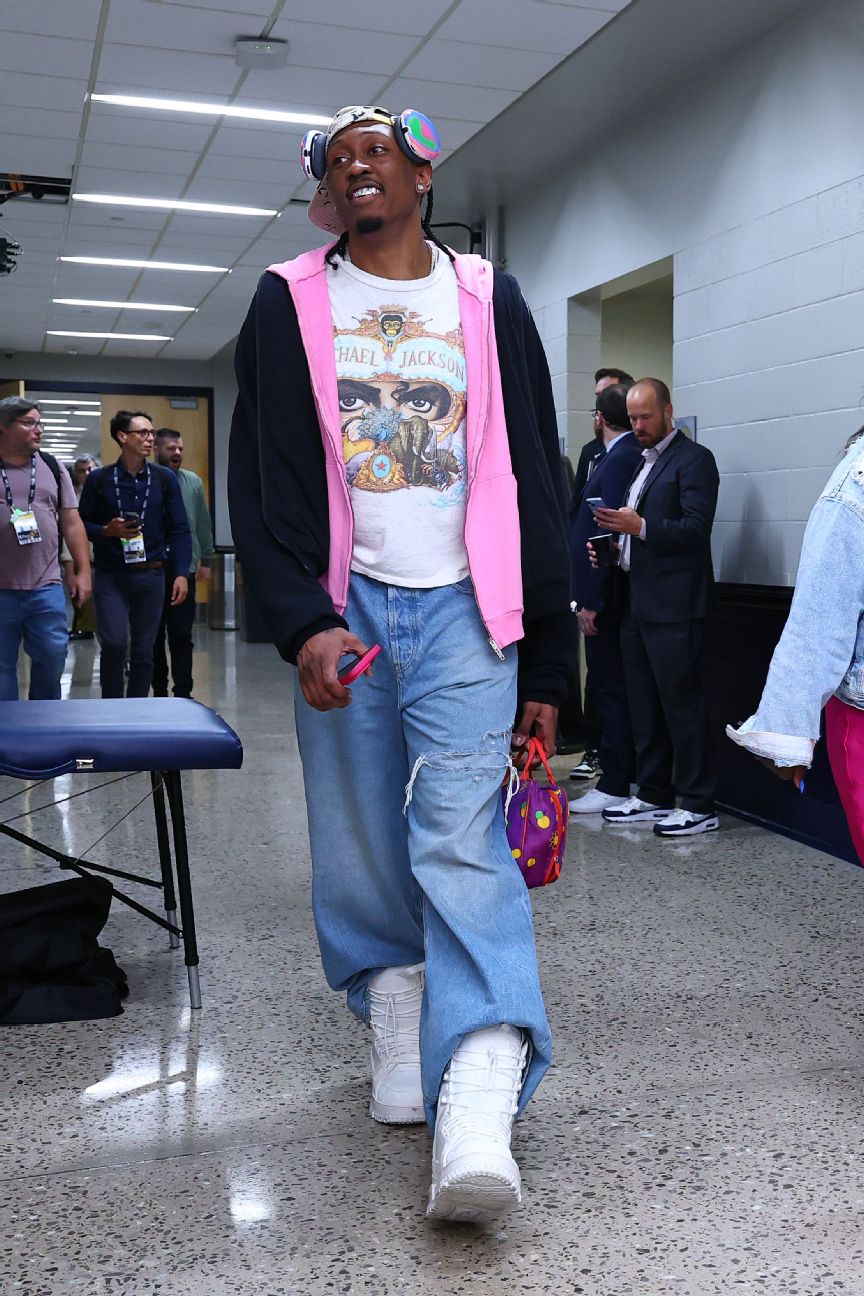
For Game 1 of the Finals, Williams, 24, went with a vintage relaxed look with a 90’s feel, sporting a black and pink zip-up hoodie jacket with a hat, a graphic T-shirt featuring Michael Jackson off the “Dangerous” album cover, baggy jeans and a “Pinky and the Brain” soft-sided lunch bag.
“This is like a classic Gen Z cool kid outfit,” Schube said. “Big sneakers, giant jeans, little shirt and then a trucker hat that looks like maybe you could have gotten it at a gas station, but I’m sure it costs a thousand dollars. And is he carrying a lunch box? This could not be more of a Gen Z outfit.”
Holmgren, 23, also values comfort, calling his style “casual but classy” while also wearing whatever he feels confident in. For Game 1, he wore a black hoodie, sunglasses and pants. He admits he and the MVP are in different fashion leagues.
“It’s not a competition because the budget isn’t the same,” Holmgren told ESPN of Gilgeous-Alexander, who signed a five-year, $172-million extension in 2021. “That’s a dangerous game to try to play. So I don’t even try to play it.
“I look at them as fashion professionals,” Holmgren said of Gilgeous-Alexander and Williams. “And I’m more of a fashion hobbyist.”
Williams admits he’s not on the MVP’s level, either. Gilgeous-Alexander took Williams shopping in New York during the forward’s rookie season in 2022-23. Williams saw firsthand the fashion connections Gilgeous-Alexander had as the two teammates shopped at designer stores that Williams couldn’t afford back then. Williams mostly watched Gilgeous-Alexander shop that day.
“The first time, it wasn’t that fun,” Williams said of that shopping experience with Gilgeous-Alexander.
“I just have more money now so I can kind of keep up.”
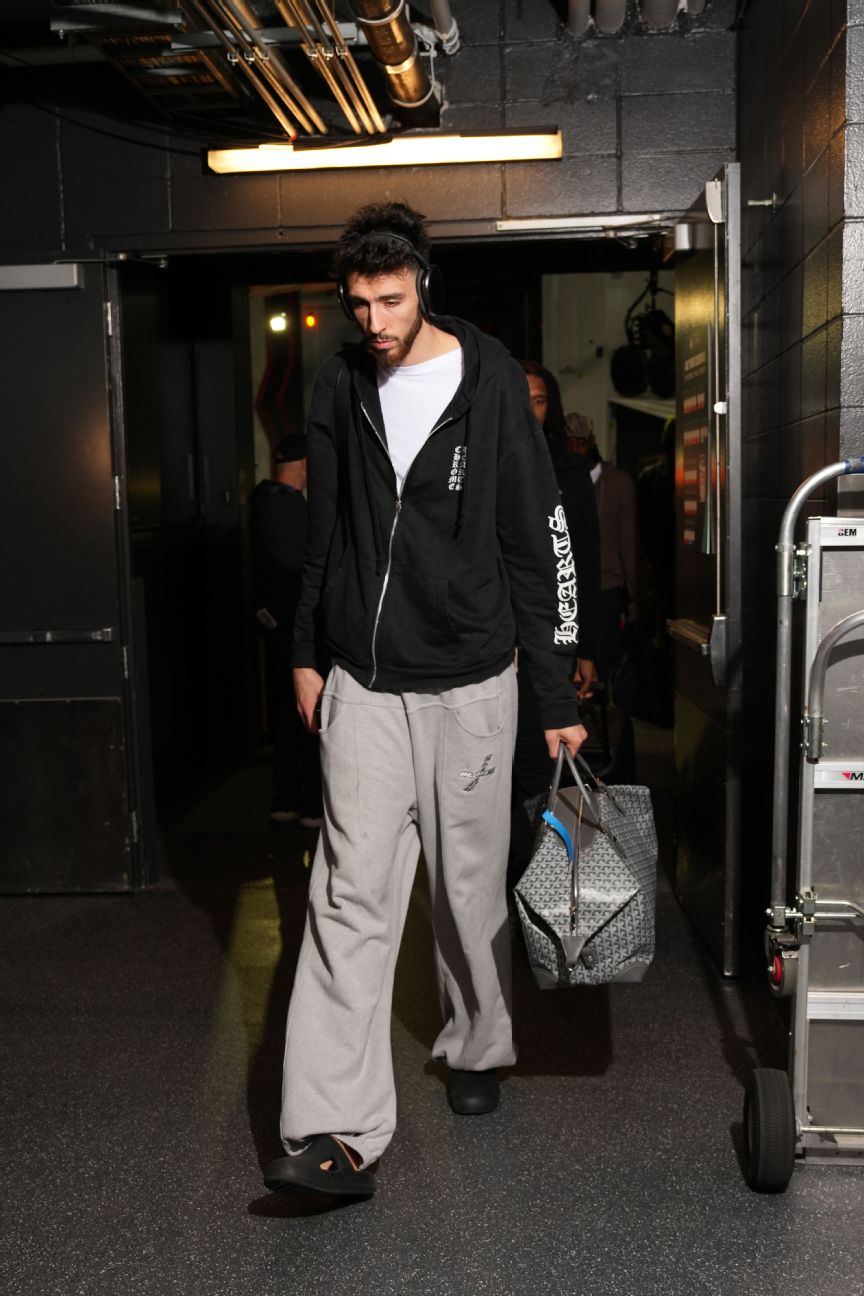
Williams said it never gets competitive between Thunder teammates when it comes to who has the best outfits. The way the MVP sees it, he’s dishing out fashion assists to his teammates.
“It doesn’t really get competitive,” Gilgeous-Alexander told ESPN as politely as he could when asked if there are any fashion battles. “I don’t want to sound like … they’re like, those are my kids in terms of fashion. I showed them what to do and what not to do.”
It’s why Oklahoma City is once again the fashion epicenter of the NBA.
“You do not think of Oklahoma City as the most fashionable place on Earth,” Schube said. “And yet there’s something in the water there. They’re a small market. [GM] Sam Presti, who built both of those teams, is obviously a guy who knows how to be creative and flexible when it comes to building a roster. And that means finding young players and empowering them.
“And so you get these young dudes who are just absolutely dripping and it happens to be in Oklahoma City.”
BEFORE GAME 6 of the Eastern Conference finals, Haliburton walked into Gainbridge Fieldhouse looking like he was dressed for a funeral. As the Pacers were poised to close out the New York Knicks, Haliburton arrived in a sharp all-black outfit with sunglasses while carrying a black duffle bag.
Ben Stiller, actor and die-hard Knicks fan, reposted a video of Haliburton’s walk with some trash talk.
“Good thing he brought his duffel for the flight to NY,” Stiller wrote on X, hoping the Knicks would force a Game 7.
Haliburton eliminated the Knicks with 21 points and 13 assists in the 125-108 Pacers’ win, and the point guard gave Stiller — who spoofed male supermodels in his comedy “Zoolander” — a perfect response.
“Nah, was to pack y’all up,” Haliburton wrote back on X.
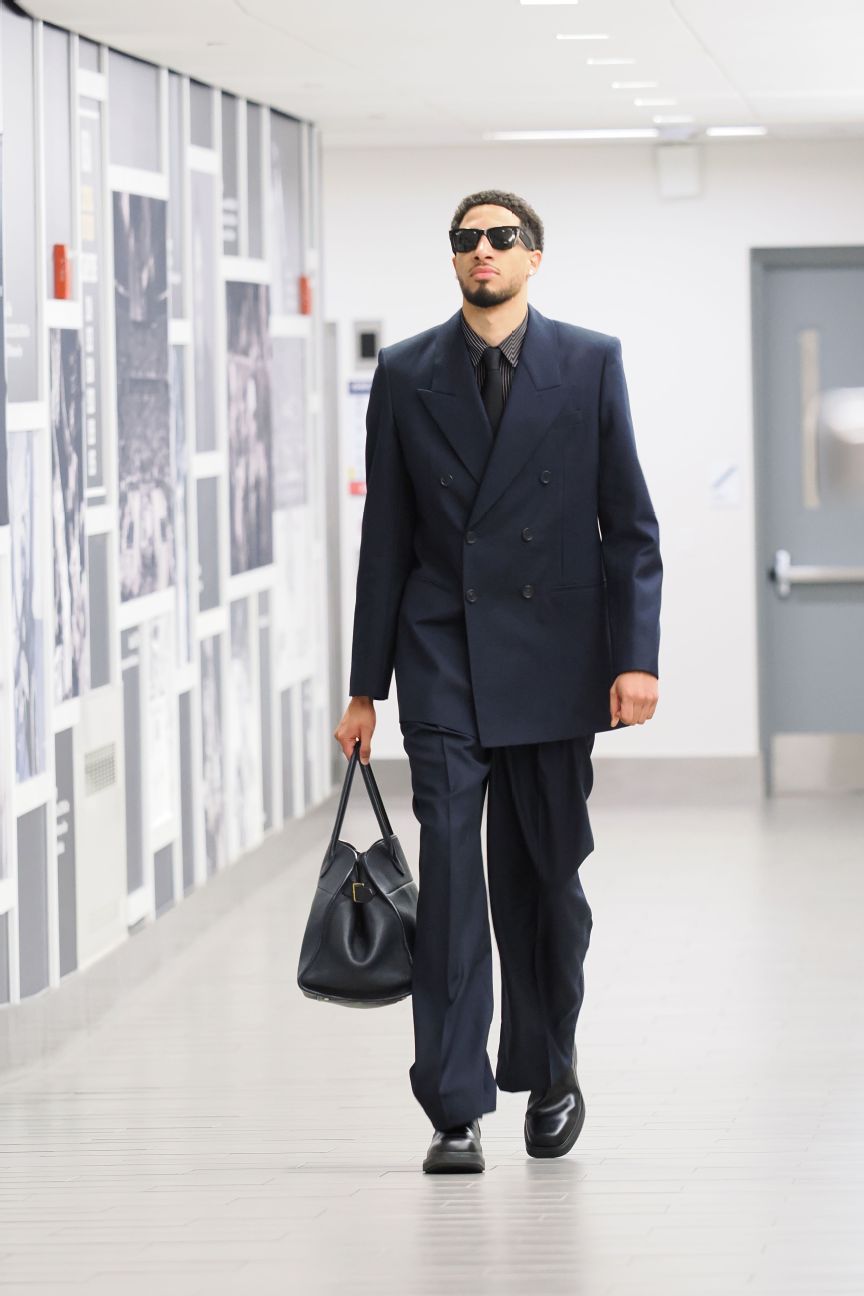
The Pacers point guard is a massive wrestling fan and lives to come off the top rope with his fashion ensembles. He’s cognizant of how some arena tunnels are more high-profile than others, like Madison Square Garden’s ramp. As Schube points out, Haliburton seems to be “aware of how this is all going to play on social media” and “of the narrative and theatrics of it all.”
“Good style,” Gilgeous-Alexander said of Haliburton. “Above all, he wears it. He embraces his style and doesn’t care what anyone else thinks. He just wears it. And that’s all you can really do is, ‘I’m going to go in my closet and have my eight outfits that I think are fire’… all you can do is trust your feel and wear it with confidence.”
Haliburton, 25, is used to hearing the good and the bad on social media about his style choices. Whether it’s going for a “Peaky Blinders” look or wearing a Prada trench coat that drew comparisons to Inspector Gadget online, Haliburton will stir it up.
“He doesn’t have one lane he just sticks to,” said Pacers teammate Myles Turner, who also is into fashion with a self-described “preppy Western” look. “Whatever he feels, he’s going to throw it on and it’s a conversation starter piece for sure.
“He’s bold, but so is his personality.”
At the 2024 All-Star Game, Haliburton wore a long double-breasted Prada runway jacket that had shaggy blue fur around both of his biceps and his knees. Some online likened the blue fur to the Cookie Monster.
“I think people just always fight things that they haven’t seen before or everybody just wants to fit in,” Haliburton told ESPN. “This is a world where if you try something different, everybody’s going to say something about it. I don’t dress like anybody else and I’m OK with that.
“I think there’s a lot of people that are truly in the fashion world that would tell you that I dress very well and I believe I do. But for some people who really don’t know anything about fashion, it would be like he dresses terrible. I just do what I want to do at the end of the day. I’m not here to please anybody.”
Haliburton chooses a practical approach with his outfits. While he likes to stand out in Comme des Garcons, Prada and The Row, Haliburton keeps a lot of pieces in rotation. He said he can wear 10 to 15 of the same pairs of shoes and rewear pants or a black button-up several times as layering pieces.
“I mean, we got money, but clothes are expensive, bro,” said Haliburton, who tries to stay grounded even after signing a five-year extension worth up to $260 million in 2023. “That’s why I try not to get too many super loud pieces that you could see I wore again.”
When it comes to those flashy pieces, Haliburton will sometimes sell them on Grailed, an online resale marketplace, with an anonymous account or give them to Olivier Rogers, his fashion stylist, to sell on sites like The RealReal.
“I have secret accounts on sites where you can resell clothes,” Haliburton said. “Even if I don’t get all the money back … say if I bought a jacket for five grand and I get three grand back, that’s better than getting nothing and it’s sitting in my closet.
“When I first came to [the NBA], it bothered me so much. I would spend all this money on a colorful pair of jeans and a vintage T-shirt. And once I wear it once and post it on my Instagram, I can’t wear it again.”
As Haliburton looks to stun the Thunder again in Monday’s Game 5 like he did in Game 1 with his game-winning shot, the Indiana star returns to the Paycom Center hoping to recreate the magic of that night, which started with honoring the standards of bringing heat to the OKC hallway.
One thing likely not for sale are the Hali 1’s he wore in Game 1. After he hit one of the most clutch shots in Finals history to complete the Pacers’ comeback win, Haliburton placed his signature Pumas next to the microphone for his postgame news conference.
“The secret sauce today was these,” Haliburton said as he pointed to his shoes after helping erase a 15-point fourth-quarter deficit.
Later, he would post on X the perfect mic drop — repeating one of the most iconic lines in NBA fashion history and an homage to Spike Lee’s Mars Blackmon.
“It’s gotta be the shooooeeesss,” Haliburton wrote.


